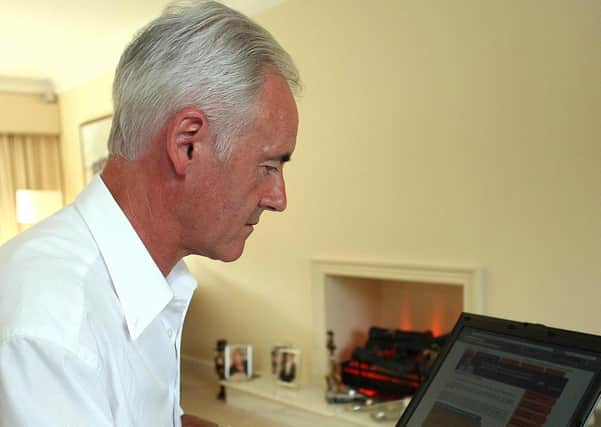Coronavirus: What happens if the internet goes down? – Aidan Smith


Have you heard the one about Covid-19 being a plot dreamed up by the internet? First, the global pandemic sends us fleeing to our homes. Some of us have to be dragged there, or have policemen fill their helmets with water to douse our flagrant barbecues, or have to be stopped from hopping over to our second homes, but this is where we must remain.
What can we do with ourselves, all cooped up? We could dig out the Cluedo but we know that Col Mustard and the lead piping are missing, never to return to the box. We could read books but why do they have so many pages and why has this woman with the femme-fatale peekaboo hairstyle suddenly showed up or are we supposed to have remembered a previous fleeting but significant appearance? We could talk to each other but … crikey, how does that work again?
Advertisement
Hide AdAdvertisement
Hide AdNo, this is what we do: we give thanks and praise and glory in the highest to the internet. Previously it had been cursed and condemned and pretty much held to blame for the death of society. But guess what? It’s not a force of bad after all but a force of great good. The lockdown has taught us this. Oh worldwide web, in these dark times you are connecting me, like string between two tin cans, and in no particular order, to: Waitrose’s home delivery service, the rellys and some sites I’d rather my wife didn’t know about (prog-rock fanclubs – what did you think I meant?). Can you ever forgive me for not trusting you, not loving you?
The plot is a joke. I mean, I’ve heard some wild conspiracy theories in my time – via the internet, mainly – but that’s going too far. Imagine, though, if it became the internot and suddenly went kaput? In fearful unison, this would be my four children: “What are you saying, Dad – that such a scenario would be worse than the three-day-week of the 1970s with camping stove-cooked Spam by candlelight and no Top of the Pops which you’ve always maintained was your war?” Yes, indeed.
Videogame now a lifeline
It’s good to talk, as those old BT ads used to say, but it’s even better to see Granny, via Skype or some other internet-aided facility, as she tries to break the all-comers jigsaw record in the living-room she can’t leave, or worse, is stranded in her care-home, or worse still, is rigged up to a ventilator.
And what about the kids? How would parents keep them educated and amused without the internet? The schoolgates clanged shut so quickly that while head teachers might have been able to send pupils away with initial worksheets, they need the net to keep them coming otherwise assignments would have to arrive by post. I don’t know about your 13-year-old son but mine would think it hilarious to intercept them and devise a variation on “The dog ate my homework”.
Like millions of dads I’ve raged against Fortnite and hated that the endless zapping and blamming creates yet more battles within the family. But right now, listening at the door to the delirious drivel my lad and his pals talk via their internet-linked headsets, I fully accept that the videogame is a lifeline for them when they cannot meet in the park for football and wheelies. It’s a deathline for the poor virtual suckers blown to smithereens but, hey, them’s the breaks.
It’s easy to sit smugly in a study full of books and be down on the internet. A couple of the books on my shelves are by Jonathan Franzen and I nodded knowingly when the American author pronounced: “It is doubtful that anyone with an internet connection at his workplace is writing good fiction.” But I laughed when his logic was quickly questioned and sent up by other writers, including Nathan Goldman: “Say what you will about Franzen but he’s great at getting everyone on Twitter talking about him without actually being on Twitter himself, meaning he’s better at Twitter than any of us.”
Lear a lockdown creation?
Did Shakespeare write King Lear during quarantine? His greatest tragedy was composed in the early years of the 17th century when bubonic plague was rife, killing tens of thousands. That the bard might have been this brilliant under such duress is currently being held up as evidence that near-detention doesn’t have to kill creativity. Indeed, I have started to shout lines from the masterwork during homeschooling (“Nothing will come of nothing”) when I sense some slacking is imminent.
But how did I find out that Lear might have come from lockdown? Answer: the internet. Any day now I expect the theory to be added to the play’s Wikipedia page. Indeed – snobbish as I’ve been of the online encyclopedia in the past – I may even add it myself.
Advertisement
Hide AdAdvertisement
Hide AdConsulting Wiki? It’s too easy. Parroting a political opinion or verdict on a movie you’ve read online? Too easy. Checking your smartphone constantly, being scared you miss something, engaging in people’s lives and yet not actually engaging (eg, conversation), refresh-refresh-refresh? Too easy. But dubbing the internet the original social distancer? Far too easy. I can get as nostalgic as anyone for life, pre-internet. I carried around with me all the words to the Top Cat theme. I remembered the address where Laurel and Hardy were delivering the piano (1127 Walnut Avenue). I queued overnight to see David Bowie. Post-internet, all of that and more has been rendered redundant.
But it’s here now. We cannot put the genie, never mind the Jean Genie, back in the bottle. We can have a discussion after Covid-19 is over about how much the internet is killing us. Right now, it’s saving us.

